Book contents
4 - Medicine as metaphor
Published online by Cambridge University Press: 24 November 2009
Summary
‘JOHNSON'S MEDICINE looks backward’, declared W. K. Wimsatt. He was discussing the evidence of Johnson's medical interests contained in the Rambler series of essays, written and published between 1750 and 1752, whilst Johnson was also engaged on the Dictionary. The only medical writers mentioned there by name are Hippocrates, Celsus and ‘old Cornaro’. Boerhaave, ‘the learned, the judicious, the pious Boerhaave’, is, it is true, cited, but as a moral rather than as a medical hero; William Harvey is mentioned, too, but that is part of a joke about ‘a late writer’ who ‘has put Harvey's doctrine of the circulation of the blood into the mouth of a Turkish statesman, who lived near two centuries before it was known even to philosophers or anatomists’. (Rambler 140), which writer, of course, was Johnson himself, in the tragedy Irene (1749). But Johnson's medical knowledge may be detected in the Rambler all the same, beneath that grandeur of generality which characterises Johnson's prose in this enterprise. No. 85, for example, which is in praise of health and exercise, remarks that ‘very learned treatises have been produced upon the maladies of the camp, the sea, and the mines’ and contains the following paragraph:
With ease, … if it could be secured, many would be content; but nothing terrestrial can be kept at a stand. […]
- Type
- Chapter
- Information
- Samuel Johnson in the Medical WorldThe Doctor and the Patient, pp. 141 - 164Publisher: Cambridge University PressPrint publication year: 1991

